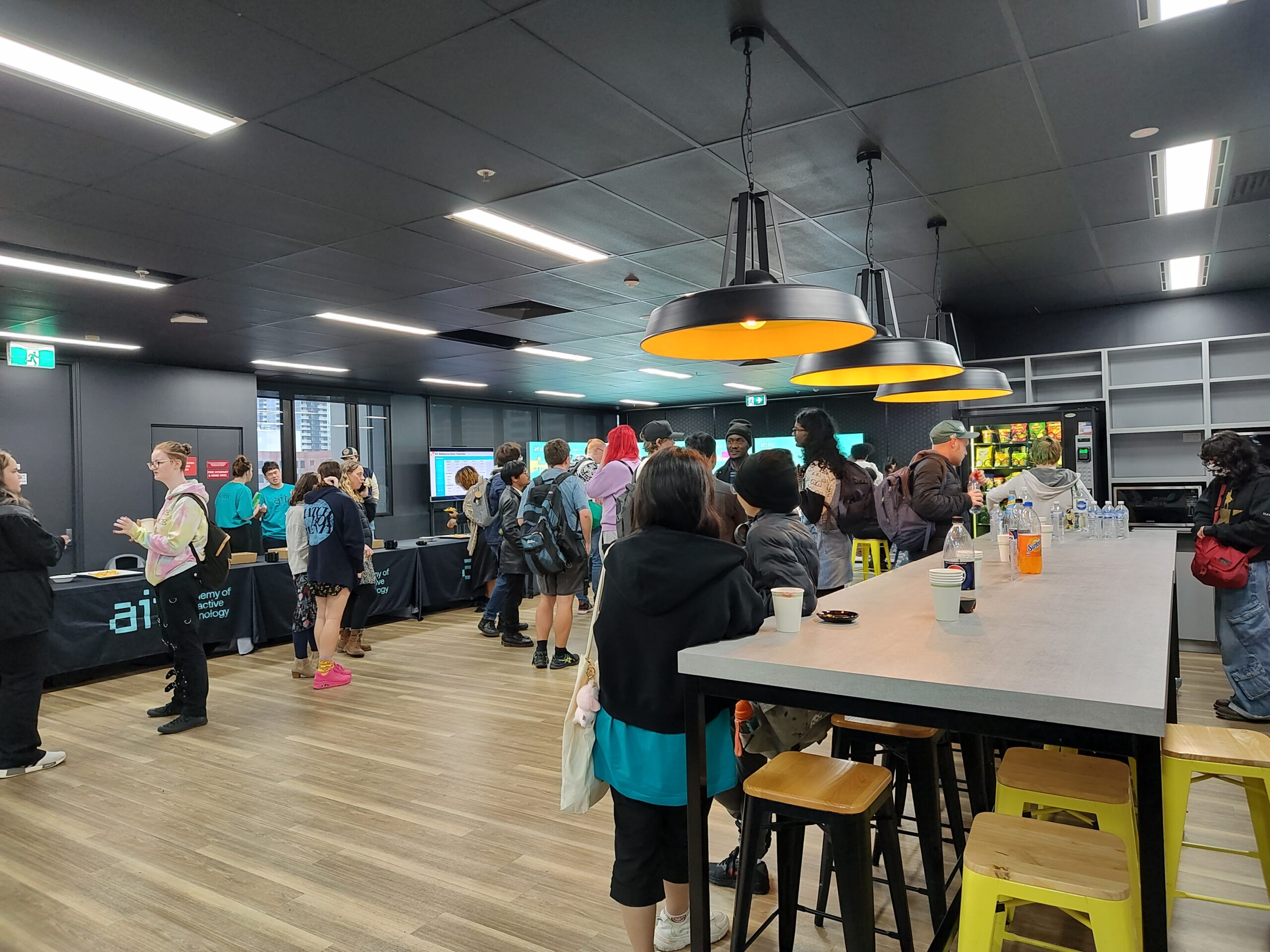Melbourne MasterTalk: Dean Musumeci, Digital Compositor for The Amazing Digital Circus
The event allowed students to see what Dean has been up to out in the wide world, from running his own business as a director of photography and digital compositor, to his work on Gooseworx and Glitch Productions’ The Amazing Digital Circus – a show with a cult following and millions of views on YouTube.
“I’m not going to explain my process,” Dean warned. “Because that is years of experience. And it’s not class. You should have been here two years ago.”
Despite this humorous disclaimer, Dean was incredibly generous in sharing his experience, including his processes, and gave tips for our students as they study and start out in the industry.
Dean had the audience in hysterics throughout his talk. From the laughter of appreciation at the common trials of creatives starting out in industry, to his love of fan fiction and conventions, and the universal pilgrimage of completing the doughnut tutorial in Blender, it was clear that Dean was in tune with the lives of our AIT students.
Learning to Create Films
To show how our students could end up where Dean has, he walked us through his journey from studying, “where it all began” to the early days of starting a company with friends, and now working at Glitch Productions, whose “mission statement is, ‘We just want to make cool shit.’”
With some study under his belt, Dean decided that he wanted to more fully explore the world of filmmaking.
“So I ended up starting a diploma in film and television, and that diploma quickly became a bachelor [of film], because, I loved it.”
“I noticed that there was a trend, things were changing, the internet and YouTube and all these streaming platforms, video games, just digital entertainment… that’s where a lot of people were consuming their entertainment, as digital art, which is what everyone here, I assume, is interested in, and what we all want to be doing.”
“I learnt video production and editing, I learnt the basics, and that’s one thing that I like to tell people, is that, when you go to a school, and you go to learn, try and learn everything, as much as you possibly can, right? If you’re in film and TV, and you’re kind of interested in animation but don’t really think you want to get into it, learn a bit about it anyway.
“If you want to go to a school and start a degree and you want to be a director, well you’ve got to know how everything works, so learn as much as you possibly can.”
Becoming a Filmmaker
Dean’s career as a filmmaker began while he was still studying. Through shared hobbies and a love of creating, Dean, his fellow students, and friends from conventions began making their own short films. Films that became better and better as their skills advanced, until they were receiving awards and industry recognition.
“I met like-minded people, we worked together, we went to conventions, and I expanded my skillset outside of video.”
It was at uni that Dean met fellow AIT educator, Michael Irwin, who he credits for “getting me involved in sanding back lots and lots of Nerf guns for all our silly short films.
“And speaking of silly short films, we had our graduate project, The Old Republic. This was our Star Wars fan film that we made as our very last production at school, and that was the project that kickstarted my post-education journey.”
“It’s so long ago, and it’s pretty cringe, but we did do well at the Martini Awards ceremony, which helped us gain a bit of notoriety from a number of practitioners and educators as well.”
“So if you want to make a fantasy or a sci-fi, go to cons, meet some cosplayers, heat some foam, paint some stuff, buy some cheap toys at the two-dollar-shop and make it look like it’s lived-in, ‘cause that’s exactly what we do. And use a lot of chocolate powder for weathering – thank you, Michael.”
Starting a Film Company
After uni, Dean and Michael continued to work together.
“So, what happened after uni? I was freelancing as a camera operator, a director of photography, a video editor, and also doing motion design.”
“We did a lot of short films, a lot of commercial and promotional work as well, and then we wanted to sort of put a brand, or put a name to our little conglomerate. We named ourselves Valiant Film Company.”
“And there was one guy, who has stuck by me, through thick and thin, Michael Irwin, we go way back. All the way back to the sandy dunes of Portland, to the muddy, gravelly, ah, horse-shit-ridden pits of Kryal Castle. Did we have a good time? Absolutely not. But we made some fantastic stuff.
“And that was what I was doing. I had my own gear, had my own film equipment, I would also utilise other people’s stuff that they were willing to contribute to the cause. And that was kind of my schtick. I was a camel, but also responsible for, you know, a lot of editing, colour correction, and visual effects, and motion graphics as well.”
Starting Out in Digital Compositing and Motion Graphics
“I ended up developing a specialisation in visual effects. And then COVID happened. And so, while I was cooped up, my camera was dusty, I couldn’t do anything, I’m like, ‘Well, Unreal Engine seems pretty cool. Seems pretty easy to get into. Might give it a go.’”
“I just started creating some vignettes, some scenes. Some environments with a little bit of compositing knowledge, a little bit of sound design. I just started rendering these out, because I’m like, well, it’s good practice, and you know, environment art was kind of just fun to do anyway.”
“So, we talk about post-grad education. Through my time freelancing and working on our content, I tried to upskill where I could. While I was working I did some online courses, just freebies, stuff like Udemy, stuff on Future Learn – doesn’t cost a thing. They give you some practice footage and they kind of instruct you on how to do stuff, so I was learning how to rotoscope, you know, how to obviously trace people frame-by-frame, so that I was able to composite effects behind them.”
Building a Network
“So, towards the end of COVID, when we all started coming back to life, and Melbourne, and school and work, I started to sort of put myself out there, and if you’re going to take anything away tonight, this is perhaps the most important lesson… you need to network, in order to get anywhere.
“It doesn’t matter how good your reel looks, or if your CV is schmick. You need to meet people. They are the ones that will get you in the door.”
“So there is a group called DLF, which is the Digital Labourers Federation. They’re also known as Masters of Motion. It is a little, tight-knit VFX community in Melbourne and Sydney and it has people from all walks of life, and all levels in their career. People who are aspiring, people who are looking for work, and people who are mentors, people who are about to literally leave, and go, ‘I need to pass on my knowledge to the next generation.’”
“They post jobs all the time, so it’s a very good resource if you’re looking for work.”
“Pretty much at the end of my time at AIT… mentors helped me revamp my showreel and CV. I actually made a website for my portfolio instead of, ‘Oh, you can find it on ArtStation or Instagram.’”
Starting at Glitch Productions
“And so, I began applying for work, it got down to Cumulus and Glitch Productions, and it was a Sunday afternoon, where I got an email back… and Glitch said, we’d be very happy to take you on.”
“Many of you might know [Glitch Productions] to be responsible for the release of The Amazing Digital Circus, but also Murder Drones, and Meta Runner.”
“They make some of our favourite YouTube series. They only upload to YouTube. They don’t deal with any of the other streaming services, because they want to retain creative licence.”
So what does Dean do at Glitch?
“I have final eyes on everything that goes through. I am at the end of the pipeline, the bottleneck at the very end.”
Dean takes care of heads-up displays and screen UIs. He is, “responsible for anything you would usually see on a screen that’s moving.”
Of course, he is also responsible for the digital compositing that gives the Glitch Productions shows their wow factor.
“Gunshots, dust, smoke, lens flares. All the fun stuff.”

What if you missed our MasterTalk but still want to catch up with Dean?
“Oz Comic-Con in Melbourne. Get your tickets. I will be there working at the [Glitch Productions] stall.”
And if you want to hear about more great events like this one, you can sign up for our events mailing list.
Imagine a creative college where you can pursue your dreams in 2D animation, 3D animation, film, game design, IT or mobile app development.
Find out more about AIT and our courses by visiting our connect page and choosing your own adventure. Talk to someone about your study options, book a campus tour and have a look around, chat with a current AIT student or get started on your application.
